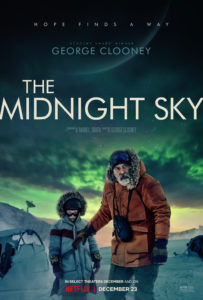Review by David Baldwin

A mysterious catastrophe has destroyed the Earth as we know it as humanity is slowly poisoned by radiation. With little hope for survival, Arctic-stationed Scientist Augustine Lofthouse (George Clooney) refuses to evacuate. He wants to stay behind so he can warn the team on the Aether spacecraft orbiting Jupiter to not return. But impending radiation, bad connections, cancer and a young stowaway named Iris (newcomer Caoilinn Springall) all stand in the way of Lofthouse sending his warning.
The Midnight Sky is George Clooney’s most ambitious and large scale directorial undertaking to date. He has mainly gravitated towards period pieces in the past (and whatever the hell Suburbicon was supposed to be), so it was a bit of a surprise to hear he was taking on a meditative science fiction doomsday thriller. I feared he might be in over his head, but my concerns practically vanished within seconds of the film beginning. Everything about the look of this film is great, with the meticulously detailed Production and Set Design really standing out. The Special Effects are strong, but slightly dodgy in some cases (yet still some of the strongest of any Netflix film). The majority of action beats are appropriately thrilling as well, although two are a bit too chaotically confusing for their own good. And the Score by Alexandre Desplat is simply wonderful — alternating between whimsy, melancholy and white knuckle thrills on a dime. Everything about the way The Midnight Sky looks and sounds is terrific.
It’s the rest of the film that is the problem.

The story Clooney tells here is for lack of a better phrase, a total mess. It feels thrown together with no sense of rhythm, and the connections between each story are razor thin . He initially starts with Lofthouse on the ground, the crew of the Aether in space and flashbacks to Lofthouse as a young man. He ditches the flashbacks less than halfway through, and then does not seem to know just how much emphasis and focus each of the remaining stories should possess. Should he focus more on Lofthouse’s desperate struggle for survival and desire to warn the Aether crew of impending doom? What about his budding comradery with Iris, who may or may not be hiding some secrets? Or should he focus on the crew of the Aether, lead by astronauts Sully (Felicity Jones) and Adewole (David Oyelowo), as they try to come back to Earth with zero clue about what’s going on?
Clooney remains undecided for the entire film, so we end up with longwinded scenes that only partially connect to one another and a grand story that does not click until the final seconds of the film (and even then, the connection is more of a laughable “Huh?” then a genuine connection). Worse, we barely gleam any motivation for any of the characters beyond what is readily there on the surface. We are supposed to feel something for these characters and their decisions — but Clooney never gives us anything to latch onto. He assumes you will react the way the film intended, and not in the clueless way it actually comes off. Whether this is his fault, or the fault of Screenwriter Mark L. Smith (or even original Novelist Lily Brooks-Dalton), is not immediately clear. But there is a lot of information missing here and the connections between characters are tenuous at best.
And who made the decision to have the film stop dead in order for the majority of the main cast sing along to Neil Diamond’s “Sweet Caroline”? Do not get me wrong, I love the song and the memories it evokes anytime I listen to it. But its usage here is baffling, unnecessary and ranks as one of the most unintentionally hilarious scenes of the year. I would forgive this if it only happened for a few seconds. But it happens for almost the entirety of the song, which makes the decision to include it here all the more strange. I imagine it was added to liven up how dour and depressing the film is, but much like other scenes in the film, it ends up going way too long.

Jones, Oyelowo, Chandler, Demián Bichir and Tiffany Boone are all uniformly good as the Aether crew members. The film does not ask much of them, but they each put in an effort anyway (with Boone being the only one afforded a large standout moment). Springall is great as the mute Iris, communicating wonderfully with her eyes. Clooney is just as terrific as you might imagine, but there is a spark missing from his performance as Lofthouse that could and should have made his work here substantially stronger.
I really wanted to like The Midnight Sky. It kept my attention and never felt boring, despite the handful of tedious moments sprinkled throughout the film’s running time. It looks and sounds terrific, and proves Clooney can handle a large scale endeavour like this as Director. But his script is weak, his story is a mess and his great cast are only able to do so much without feeling totally wasted. I think there was a lot of potential here for greatness. I just wish we could have seen what that looked like.
The Midnight Sky streams on Netflix starting today, Wednesday December 23.